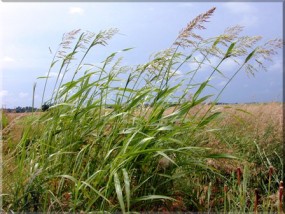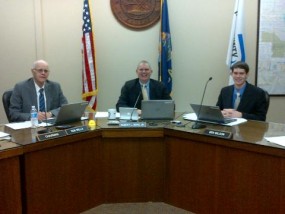If maintenance of roadside vegetation is a basic function of local government, then the state of Kansas can add that to the growing list of basic functions it’s struggling to fund — or worse, isn’t choosing to.
Riley County Noxious Weed Director Dennis Peterson told county commissioners Thursday morning the county’s contract with the Kansas Department of Transportation is on hold and because of that, johnsongrass — a nuisance weed that spreads quickly and can grow up to 8-feet tall — is out of control on K-18 between Manhattan and Junction City.

Typically the contract awards $7,000 every year to Riley County to take care of roadside vegetation along the county’s 125 miles of state highway, such as K-18.
But with the contract on hold and Peterson nervous about the dollar amount it will be worth due to possible cuts — he said it used to be a $12,000 contract a few years ago — a worst-case scenario of the county suing KDOT could be on the table.
“The only other option is that state statute allows the county to send legal notices to other government entities, but you have to be willing to stand behind that if they won’t do it,” Peterson told commissioners. “And if we have to go do the work and they refuse to pay the bill because there’s no budget, the only thing you can do is take them to court and sue them over it.
“That’s not something past county commissions have wanted to do with other government entities.”
Commissioners Robert Boyd and chairman Ron Wells weren’t against the notion.
“I’m up for it,” Boyd said.
“I’m up for it, if it comes to that,” Wells said. “But I’d rather not.”
“I hope it doesn’t come to that,” Peterson said.
Peterson said delays for the KDOT contract have been the norm the last three years, but he would like to spray the johnsongrass along K-18 sooner rather than later.
“K-18… the johnsongrass is terrible,” he said. “But we can’t start (spraying) till we hear from them. And that’s what we want to start on next.
“But it’s getting harder and harder to get funding and cooperation to do it.”

And even if KDOT gets the funding to Peterson tomorrow, he said there’s enough johnsongrass to spray it wouldn’t take long to use up those funds in their entirety.
“If they have the same funding for (this) year, at $7,000, we could spend all that in the next two to three weeks spraying the johnsongrass on K-18,” he said. “It’s that thick. There’s places where that’s all that’s growing out there.
“It’s already headed now, and it’s going to go to seed if it’s not taking care of soon.”
Peterson said the biggest danger concerning johnsongrass is when it goes to seed and gets into water drainage areas that lead to crop fields and pastures.
Johnsongrass can easily take over fields and can also be dangerous to horses and cattle under certain weather conditions if eaten in high quantities.
Peterson said the plant spread after KDOT bought land that had johnsongrass on it for a borrow pit to be used during K-18 construction. A borrow pit is a construction term for a piece of land used to obtain dirt for surrounding projects, such as a highway.
“I told them if you take dirt out of that you’re going to spread johnsongrass from Ogden to Manhattan,” he said. “And they said, ‘Well this is where we’re going to get the dirt and we’ll deal with that later.’
“Well, now it’s time to deal with that. And they’re not wanting to.”
